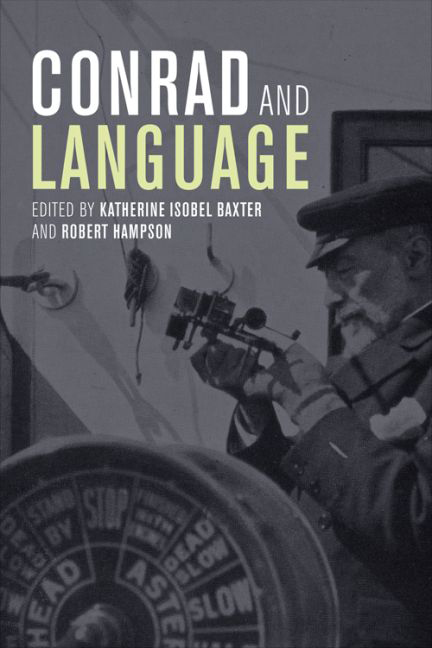Book contents
- Frontmatter
- Contents
- A Note on Texts
- Introduction
- 1 Conrad and Nautical Language: Flying Moors and Crimson Barometers
- 2 Navigating the ‘Terroristic Wilderness’: Conrad's Language of Terror
- 3 Conrad, G. E. Moore and Idealism
- 4 Conrad's Language of Passivity: Unmoving towards Late Modernism
- 5 The Powers of Speech in Conrad's Fiction
- 6 ‘Soundless as Shadows’: Language and Disability in the Political Novels
- 7 Conrad and Romanised Print Form: From Tuan Almayer to ‘Prince Roman’
- 8 Languages in Conrad's Malay Fiction
- 9 Gallicisms: The Secret Agent in Conrad's Prose
- 10 ‘The speech of my secret choice’: Language and Authorial Identity in A Personal Record
- 11 The Russian Redemption of The Secret Agent and Under Western Eyes
- Afterword
- Contributors
- Index
3 - Conrad, G. E. Moore and Idealism
Published online by Cambridge University Press: 12 September 2017
- Frontmatter
- Contents
- A Note on Texts
- Introduction
- 1 Conrad and Nautical Language: Flying Moors and Crimson Barometers
- 2 Navigating the ‘Terroristic Wilderness’: Conrad's Language of Terror
- 3 Conrad, G. E. Moore and Idealism
- 4 Conrad's Language of Passivity: Unmoving towards Late Modernism
- 5 The Powers of Speech in Conrad's Fiction
- 6 ‘Soundless as Shadows’: Language and Disability in the Political Novels
- 7 Conrad and Romanised Print Form: From Tuan Almayer to ‘Prince Roman’
- 8 Languages in Conrad's Malay Fiction
- 9 Gallicisms: The Secret Agent in Conrad's Prose
- 10 ‘The speech of my secret choice’: Language and Authorial Identity in A Personal Record
- 11 The Russian Redemption of The Secret Agent and Under Western Eyes
- Afterword
- Contributors
- Index
Summary
In this chapter, I want to compare certain aspects of Conrad's attitude to language with contemporary developments in English philosophy. In particular, I want to consider how far G. E. Moore's watershed 1903 essay ‘The Refutation of Idealism’ and Conrad's less technical but, on the whole, equally sceptical views on ‘idealism’ and ‘ideals’ can be seen to address similar problems and to express a common mood or structure of feeling. It is not my purpose here to argue that Conrad shared Moore's philosophical position with regard to Idealism, although I will suggest that the tension between such opposing terms as ‘abstract ideas’ and ‘material advantage’ in Conrad's work does bear some relation to the more properly metaphysical questions in Moore's essay. As well as this loose correspondence at the level of content, however, I want to suggest that Moore's modernist intervention in the discourse of philosophy and Conrad's modernist literary sensibility share meaningful affinities at the level of medium – at the level, that is, of language. A large part of what made Moore's philosophy recognisably new was his rigorous analysis of the meaning of inherited philosophical terms and his own deployment of a novel philosophical idiom. Moore's rebellion against Idealism – arguably the dominant philosophical school in Victorian Britain – was a linguistic, as well as a substantive rebellion. Thus, I suggest below, Moore's sense that the Idealist vocabulary of Victorian philosophy produced confusion paralleled Conrad's scepticism about some of the misleadingly abstract ‘ideals’ that had regulated nineteenthcentury political discourse, as well as his desire to refurbish this faded vocabulary using the sensory concreteness of impressionist style.
- Type
- Chapter
- Information
- Conrad and Language , pp. 44 - 63Publisher: Edinburgh University PressPrint publication year: 2016

